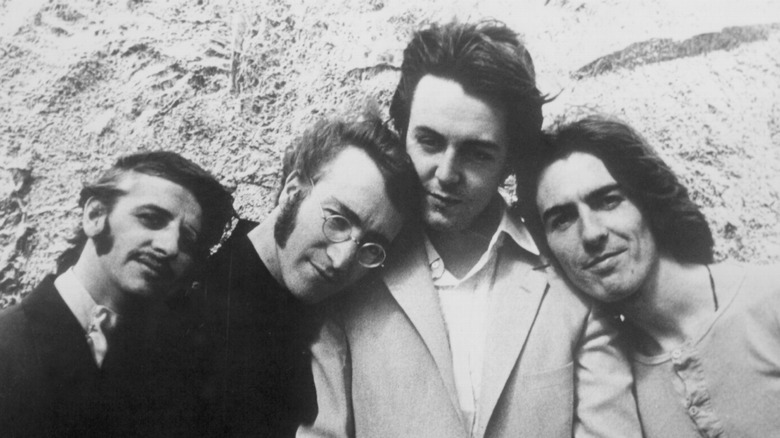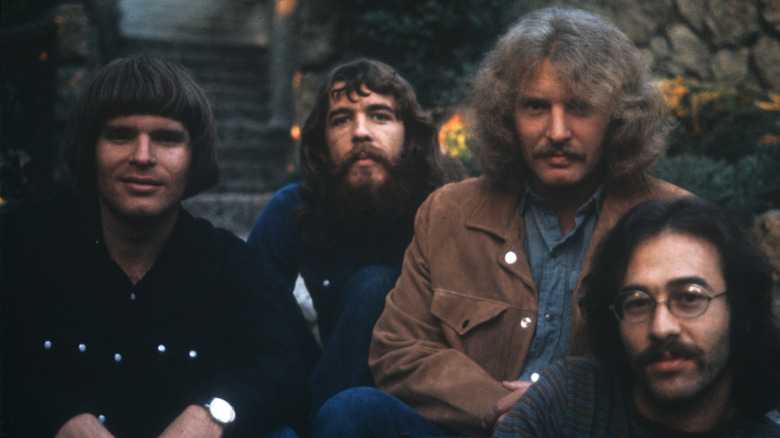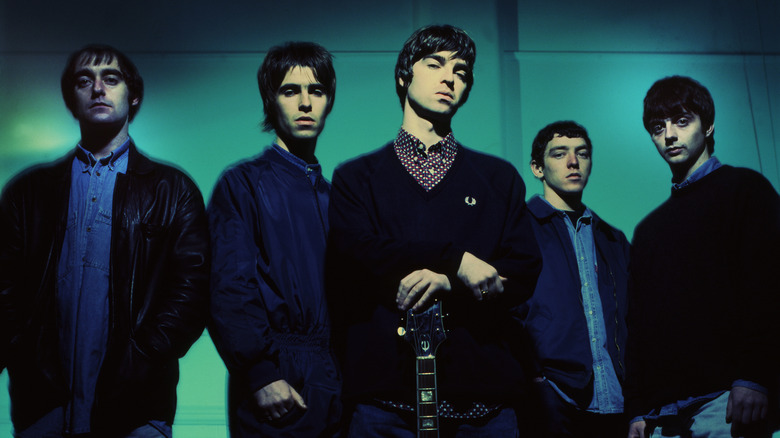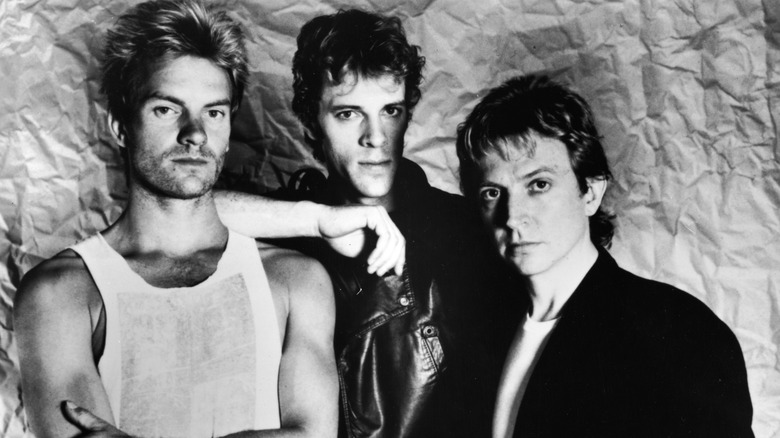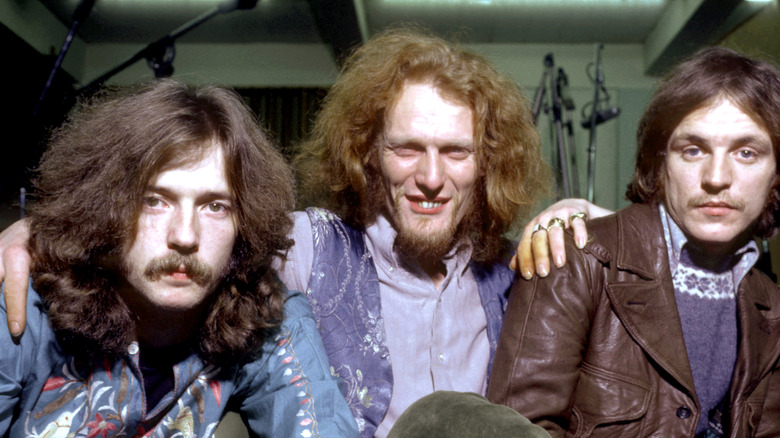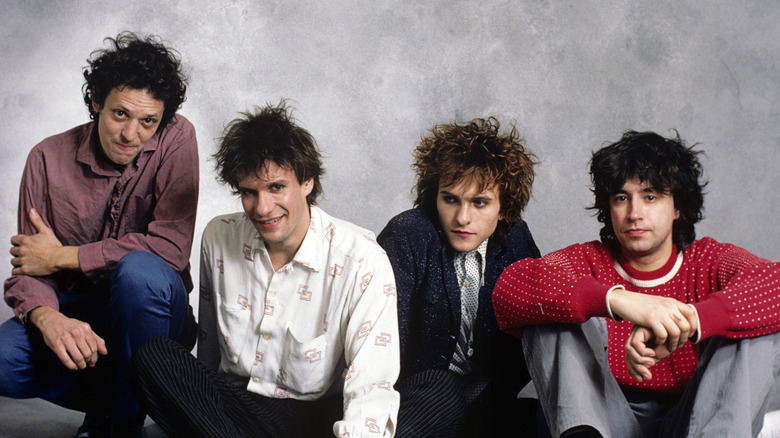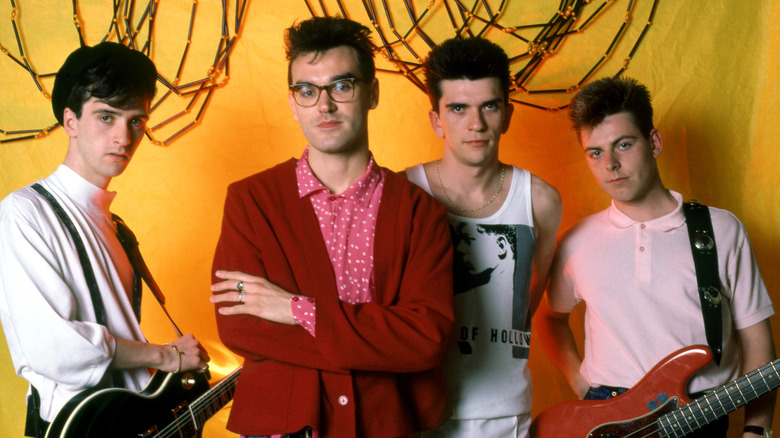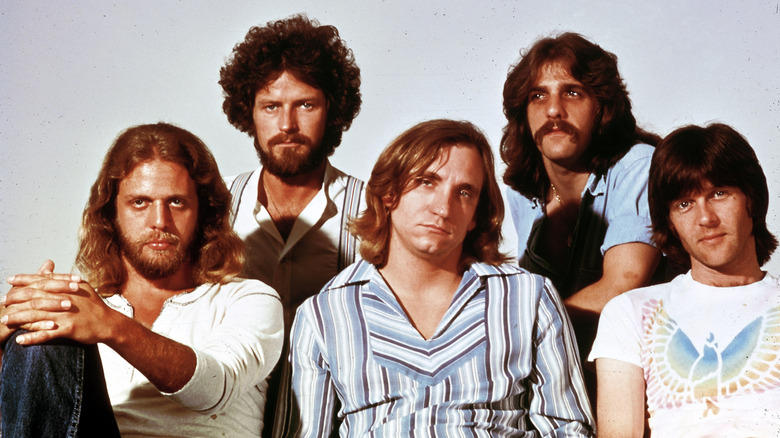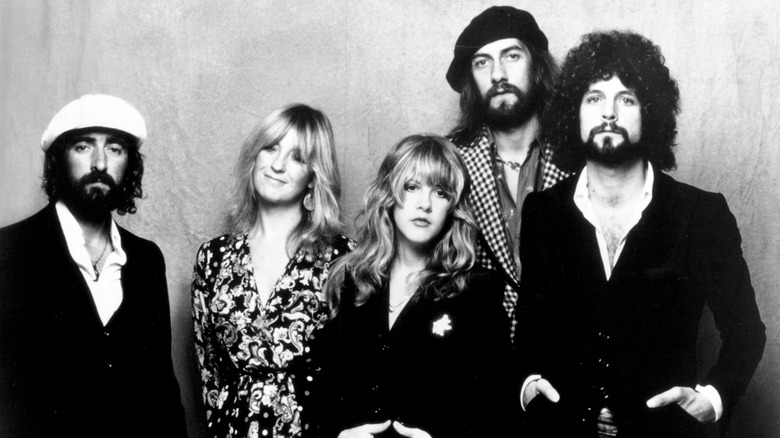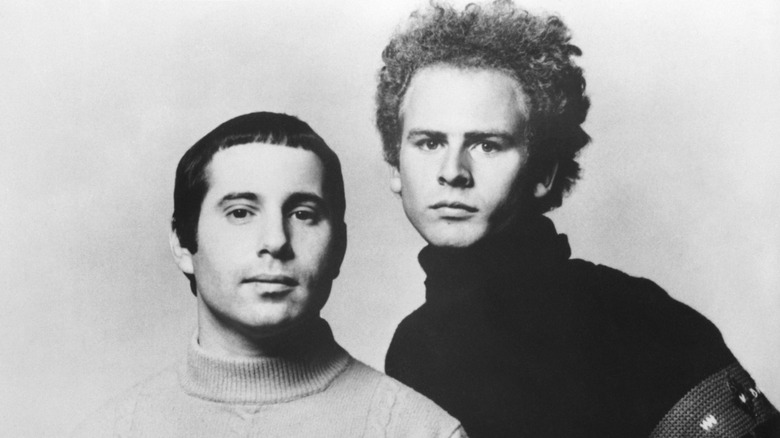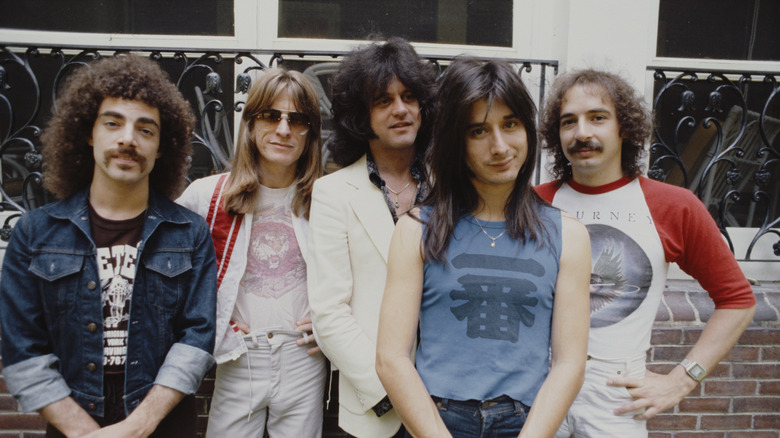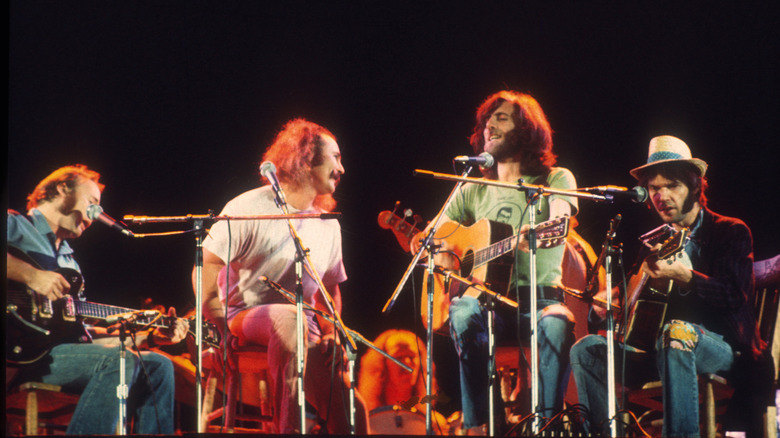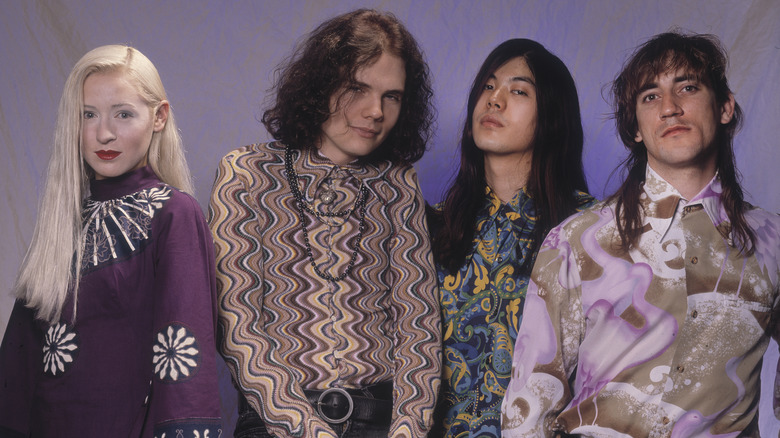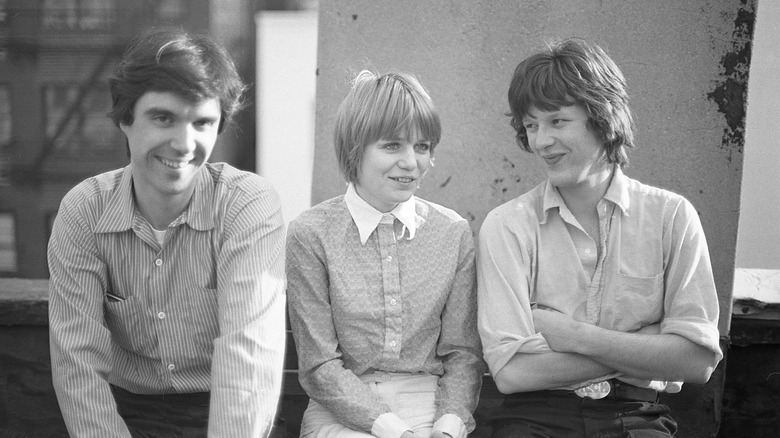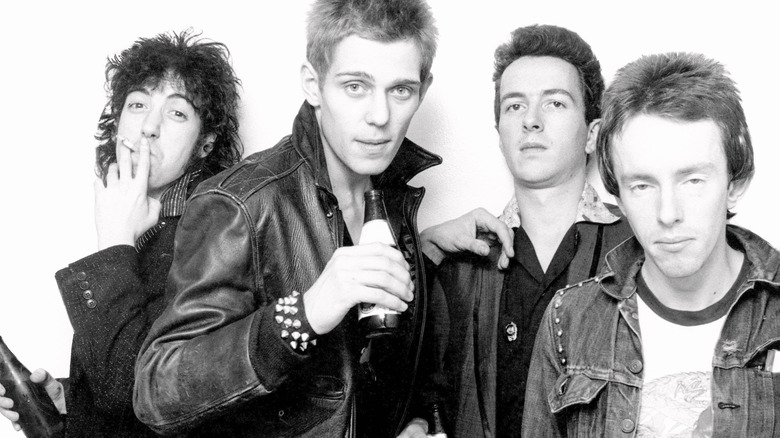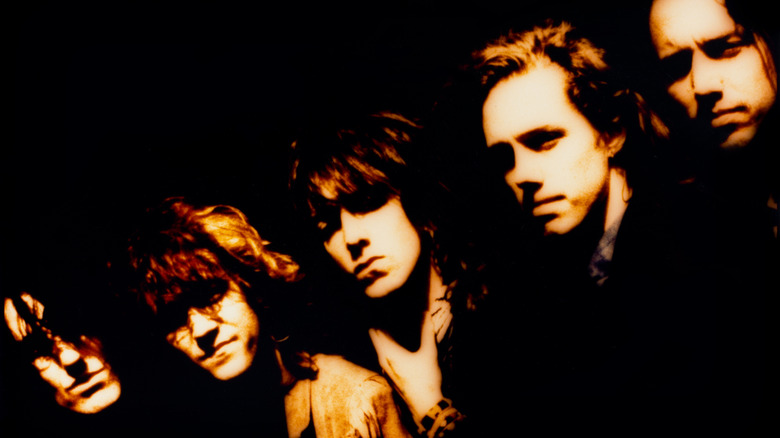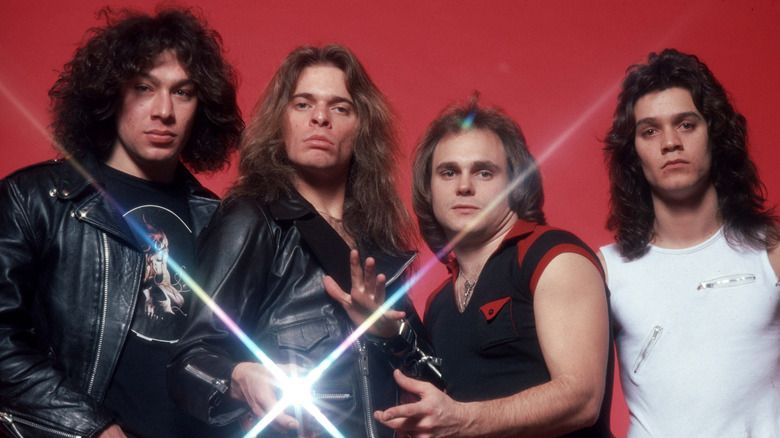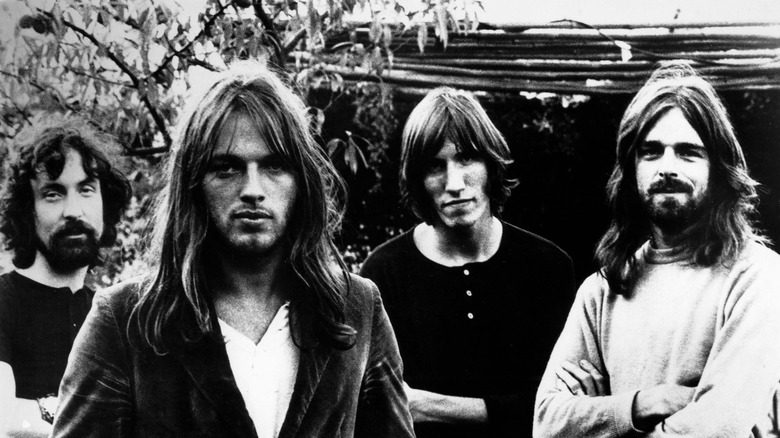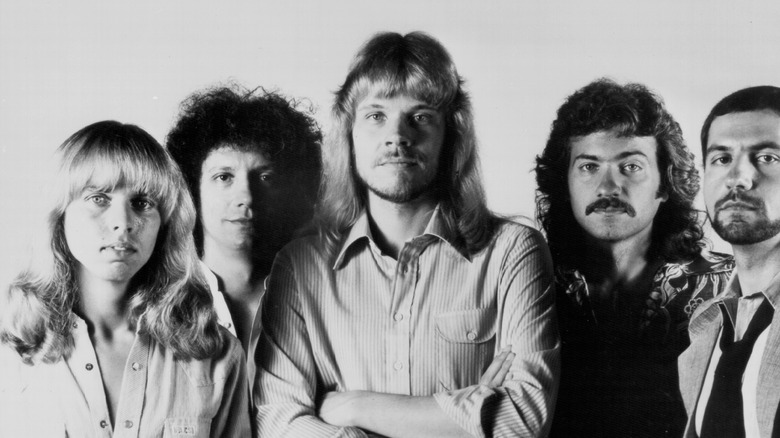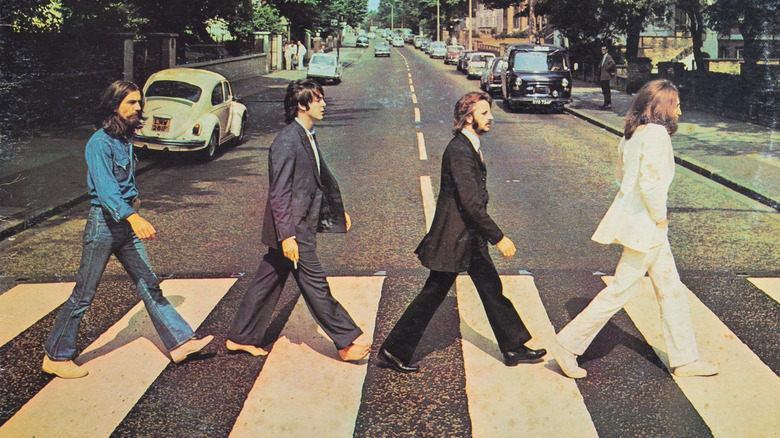Band Breakups That Were Worse Than You Thought
Some rock bands have managed to stand the test of time, a tricky balancing act that includes the rare ability to remain relevant, maintaining one's health into old age, and being able to continue to deliver the goods onstage. For examples of groups that have achieved impressive longevity, look no further than such music icons as The Who, The Moody Blues, Neil Young and Crazy Horse, and legendary British band The Rolling Stones. However, the most important factor in that longevity is the simple ability to not break up.
Keeping groups together has proven to be surprisingly challenging within the rock milieu, with numerous bands calling it quits because members couldn't get along with each other. This phenomenon spans rock sub-genres and generations, ranging from The Everly Brothers (siblings Don and Phil publicly feuded for decades), to The Kinks (brothers Ray and Dave Davies' sibling rivalry led to endless drama), to the long-running rift between Beach Boys co-founders Mike Love and Brian Wilson.
Not surprisingly, when bands call it quits over personal issues, these splits have a tendency to grow ugly. The extent of that rancor, however, sometimes doesn't emerge until after the fact, revealing that some band breakups were even worse than you thought.
Creedence Clearwater Revival
In the late 1960s and early '70s, rock quartet Creedence Clearwater Revival enjoyed a brief run as one of America's most successful rock bands, thanks to frontman John Fogerty's distinctive raspy voice, swampy guitar style, and knack for writing catchy hit songs. As the band's popularity increased, the other members of the band grew envious of Fogerty's high profile. That was particularly true of Fogerty's brother, rhythm guitarist Tom Fogerty, who left the band in 1971. CCR then continued as a trio, making one more album before calling it quits in 1972.
As Fogerty recalled in an interview with Dan Rather for AXS TV, he'd been oblivious to the other's animosity toward him. "I never looked at it as me against them," he said. "So the breakup was very upsetting, certainly."
A huge problem, however, arose due to the restrictive contract he'd signed with Fantasy Records, which resulted in ownership of all his CCR songs reverting to label owner Saul Zaentz. When his third post-CCR solo album — 1985's "Centerfield" — became a comeback hit, Fogerty found himself in the midst of an absurdly bizarre situation when Zaentz sued him over accusations that he'd plagiarized one of his old songs in one of his new ones. Fogerty ultimately felt betrayed when he learned his former bandmates had sold their voting rights to Zaentz. "The fact that every one of those people could turn their back on me at some point was unthinkable," he told The Guardian.
Oasis
Ever since Oasis burst onto the music scene in the early 1990s, the success of the British band's Beatle-esque hits was equalled only by reports of fierce animosity between brothers Liam and Noel Gallagher. Despite building a world-class musical enterprise together, the Gallagher brothers just couldn't get along. That was on full display when they sat down with NME in 1997 (via Oasis Interviews) and proceeded to brutally trash each other. "You've had too many G&Ts," Liam snarked at his brother. "Sit the f*** down." Even more demonstrative of the bad blood was the time they got into it during a recording session, which culminated in Noel cracking Liam across the head with a cricket bat.
The band's nasty breakup occurred during their 2009 tour. The tour had been fraught, with the brothers kicking things off with a fistfight and travelling to and from their concerts separately. It all derailed backstage before Oasis was set to take the stage in Paris, when Liam went to his dressing room and returned to the rest of the band with a guitar. "He came back in and he was wielding it about like an axe. He was quite violent," Noel said during a 2011 press conference, as reported by NME. "It was an unnecessarily violent act and he nearly took my face off."
Since then, the brothers have continued to viciously insult each other. In 2024, however, the Gallaghers seemingly buried the hatchet, announcing Oasis would reunite for a reunion tour, set for the summer of 2025.
The Police
A pop-rock trio with a twist of reggae, The Police erupted in the post-punk New Wave scene of the late 1970s. By the early part of the next decade, the band regularly topped the pop charts with hits such as "Every Breath You Take" and "Wrapped Around Your Finger." On the heels of their biggest success, The Police called it quits, with frontman/bassist Sting embarking on a successful solo career. "We stopped at the absolute peak, and that was really because of [Sting's] lust for a solo career ..." guitarist Andy Summers told HitFix.
As Sting explained in a 2022 interview with Mojo (via MusicRadar), as writer of the band's mega-hits, he was raking in more money than Summers and drummer Stewart Copeland due to publishing royalties. That had not gone unnoticed by his bandmates, who wanted a slice of that publishing pie, leading to battles over whose material to include on albums. "My frustration was I would have written an album's worth of material but also had to entertain these others songs that were not as good," Sting candidly admitted. "Explaining to someone why their song isn't working is a bit like saying their girlfriend's ugly ... That pain was something I didn't want to go through any more."
While the band reunited in 2007 for a lucrative reunion tour, Copeland is insistent there won't be another. "There's at least a 0000000000000000000000.1% chance of it ever happening," the drummer told Mojo in 2024.
Cream
Cream consisted of Eric Clapton on guitar, Ginger Baker on drums, and Jack Bruce on bass and lead vocals. The band's live shows became renowned for improvisational brilliance, which was no surprise considering that the band's name reflected the musicians' shared belief that they were the best at their particular instruments.
While their playing was explosive, so too were the interpersonal dynamics between them. Meanwhile, their equipment grew more powerful, and the band grew increasingly louder. "I used to get back to the hotel and my ears were roaring," Baker told Guitar World, insisting that touring with Cream had left his hearing permanently damaged. "Playing loud had nothing to do with music," he added. "There was, in fact, one gig where Eric and I stopped playing for two choruses. Jack didn't even know." Meanwhile, tensions within the band began to escalate. According to recording engineer Tom Dowd, friction was evident while recording the "Wheels of Fire" album. "I knew that there had been some animosity among the three players," Dowd recalled, "but when we would listen to playbacks in the control room, there were times when I thought they were going to kill each other."
It all cratered after a 1968 gig in Texas, when Clapton told Baker he wanted out and Baker admitted he felt the same way. "And that was it," Baker added. "We decided, for different reasons, that it was all over. When Cream died, it died. Short of murder, we couldn't solve a problem between us."
The Replacements
Led by frontman, guitarist, and songwriter Paul Westerberg, The Replacements became critical darlings in the 1980s, teetering on the cusp of major success but without ever quite getting there. A big reason for that was the band's apparent gift for self-sabotage and prodigious intake of alcohol, both of which were factors in exacerbating growing frictions within the band.
Those tensions erupted during a disastrous 1991 gig in Chicago's Grant Park, when the band broke up onstage during a performance punctuated with shouting and insults. Speaking with the Chicago Tribune, both Westerberg and bassist Tommy Stinson revealed they'd already agreed that it would be the band's swan song. "Tommy and I knew it was the final performance, maybe ever," he said. "We wanted it to be magical, and when it wasn't, it was like, 'Well, that's par for the career, I guess.' When you want it to happen, it never does."
Westerberg and Stinson — the latter going on to join Guns 'N Roses — revived The Replacements in 2013, and began performing live for the first time since Grant Park. In 2015, in the midst of a set at a music festival in Portugal, Westerberg announced it would be their final concert. During that last spate of shows, a clue about Westerberg's state of mind could be gleaned from his attire, wearing a white T-shirt featuring a different letter of the alphabet to each gig. According to fan comments on Facebook, together the letters spelled out: "I have always loved you. Now I must whore my past."
The Smiths
Following the release of their self-titled debut album in 1984, The Smiths went on to become alt-rock favorites. Led by the lilting vocals of frontman Morrissey and the hypnotic guitar of Johnny Marr, The Smiths embarked on a successful three-year run that ended when Marr quit the band shortly before the release of their fourth album, 1987's "Strangeways, Here We Come." Or at least, that was the official story.
Interviewed by The Guardian in 2016, Marr revealed his relationship with Morrissey had grown fraught. While recording in his home studio, Marr read in the press that he'd quit. Assuming Morrissey planted the story, Marr figured his only choice was to exit for real. The band then issued a statement announcing they'd be hunting for a new guitarist. "I literally thought it was a joke," Marr said. "It was the final nail in the coffin and it took me a long time to forgive them. It was pretty callous."
Morrissey has made no secret of his disdain in reviving the band. "I would rather eat my own testicles than reform the Smiths, and that's saying something for a vegetarian," he once said (via The Guardian). In August 2024, however, Morrissey had apparently had a change of heart; he took to his website to reveal The Smiths had received a lucrative offer for a reunion tour that Morrissey accepted, and which Marr ignored.
Eagles
The Eagles' SoCal soft-rock sound belied a snake pit of battling egos, wretched excess, and volatile intra-band conflicts. The tragic real-life story of the Eagles has been well chronicled, which ultimately culminated in the band's ugly breakup in the midst of a 1980 benefit performance for Senator Alan Cranston.
At the center of it all was long-simmering resentment from guitarist Don Felder toward co-founders Don Henley and Glenn Frey; the former felt the latter two believed themselves to be more talented than he was. As Frey told Marc Shapiro for his book, "The Story of the Eagles: The Long Run," his impression that Felder disrespected Cranston during a meet-and-greet led to a pre-show altercation that carried to the stage. "We were onstage, and Felder looks back at me and says, 'Only three more songs till I kick your ass, pal.' And I'm saying, 'Great. I can't wait,'" said Frey. "We're out there singing 'Best of My Love,' but inside both of us are thinking, 'As soon as this is over, I'm gonna kill him.' That was when I knew I had to get out."
In 1982, Frey told People the band would never reunite. "I just rule out the possibility of putting the Eagles back together for a Lost Youth and Greed tour," he quipped. He ate his words when the Eagles did just that with a 1994 MTV reunion special, released as the "Hell Freezes Over" album and followed by an accompanying tour.
Fleetwood Mac
In the mid-1970s, when Lindsey Buckingham and Stevie Nicks joined forces with recent addition Christine McVie in Fleetwood Mac, the result was an unprecedented level of success for the one-time British blues band. That period of success was meteoric, accompanied by the drama that inspired Fleetwood Mac's "Rumours" album.
That drama was fueled by mountains of cocaine, massive egos, and various intra-band romantic entanglements, including Buckingham's bitter breakup from Nicks, the McVies' divorce, and drummer Mick Fleetwood's affair with Nicks. The disintegration began in the early half of the 1980s, when Nicks, Buckingham, and Christine McVie pursued solo projects. "That's when it started to fall apart, I think," mused John McVie in the TV documentary "Rock Family Trees: The Fleetwood Mac Story." After reconvening in 1987, Buckingham clashed with Nicks during a meeting and quit. Buckingham returned to the fold a few years later, while Christine McVie left in 1998, eventually rejoining in 2014.
When Nicks and Buckingham clashed while discussing an upcoming tour in 2018, Buckingham exited again. He was replaced by Tom Petty and the Heartbreakers guitarist Mike Campbell and Neil Finn of Crowded House. This time, Buckingham claimed he'd been fired, telling Rolling Stone that Nicks gave the others "an ultimatum: Either you go or she's gonna go." Interviewed by Rolling Stone in 2024, Nicks blamed Buckingham. "I dealt with Lindsey for as long as I could," she said. "You could not say that I did not give him more than 300 million chances."
Simon & Garfunkel
Arguably the hottest folk duo of the late 1960s, Simon & Garfunkel racked up numerous hits thanks to Paul Simon's deft songwriting and Art Garfunkel's angelic harmonies. When both were cast in director Mike Nichols' film "Catch-22," Simon became miffed when his role was cut. While Garfunkel spent months filming, Simon worked alone on the "Bridge Over Troubled Water" album. While Simon was irked he'd been left to carry the load while his partner played movie star, Garfunkel resented Simon being unwilling to accommodate his Hollywood ambitions. They fractiously split in 1970.
The two performed together various times after that, but their relationship was never the same. That was true when they reunited for a 1981 concert in Central Park, which proved so successful that they decided to tour together. "We were famously antagonistic, but I thought, 'You know what? I am going to put that all aside and have a good reunited tour with Artie,'" Simon recalled in the documentary "In Restless Dreams: The Music of Paul Simon" (via People).
The tour's success prompted Simon to consider reuniting with Garfunkel on a permanent basis, but those plans quickly went off the rails. "The breakup that happened after 'Catch-22' was never repaired," Simon explained. "It was just a bandage put over it." Garfunkel offered his own thoughts on what went wrong in an interview featured in the documentary (via People). "It takes two people to make a group," he observed. "It takes two people to be jerks."
Journey
Led by the soaring vocals of frontman Steve Perry, Journey went from mid-level band to superstardom thanks to such hits as "Don't Stop Believin." That success came at a cost; burned out after years on the road, Perry performed his final show with Journey in 1987, and walked away. While his exit irked the rest of the band, Perry felt he had no choice. "At the end of that tour, I honestly had to stop," Perry told The Spokesman-Review. "I was suffering from serious fatigue, job burnout and all sorts of other things happening in my personal life as the result of the 10-year burn." He returned to Journey in 1995, but the reunion didn't last long; he quit again in 1998, this time for good — one of the tragic details about Journey.
Perry's bandmates responded by hiring a soundalike singer, Steve Augeri. After voice problems forced Augeri to part ways with Journey in 2006, he was replaced by Filipino singer Arnel Pineda, discovered by Journey guitarist Neil Schon after seeing a YouTube video.
Meanwhile, the relationship between Perry and his former bandmates turned ugly in 2022 when he filed a lawsuit against Schon and keyboardist Jonathan Cain, seeking to invalidate their trademark registration of the band's titles after his departure, claiming it invalidated an earlier partnership involving him. Perry withdrew the suit the following year, indicating an apparent thaw in his feud with his former bandmates.
Crosby, Stills, Nash & Young
Supergroup Crosby, Stills, Nash & Young has broken up and gotten back together so many times — and continued on in various iterations of David Crosby, Stephen Stills, Graham Nash, and Neil Young — that it was always easy to assume whenever they split, they'd eventually reunite, even temporarily. While the addition of Young to CSN for the group's second album was electrifying, Young's mercurial nature resulted in his dipping in and out of the group on his whim. Meanwhile, Crosby's escalating issues with drugs proved problematic over the years.
Even after Crosby's sobriety (not to mention his stint in prison and liver transplant), he maintained a knack for ticking off his bandmates. That was certainly the case after Young divorced his wife of nearly four decades and began dating "Splash" star Daryl Hannah. Interviewed by the Idaho Statesman, Crosby described Hannah in less-than-favorable terms. "And I happen to know that he's hanging out with somebody that's a purely poisonous predator now," Crosby said, as reported by Ultimate Classic Rock.
That effectively quashed any chances of another CSNY reunion. Crosby attempted to undo the damage during a 2015 appearance on "The Howard Stern Show." "I shot my mouth off when I shouldn't have," Crosby admitted. "I shouldn't have done it and here's the real reason why: I'm a screw-up. I have screwed up massively." Meanwhile, Crosby was also on the outs with Graham Nash; he was estranged from both when he died in 2023.
The Smashing Pumpkins
Led by frontman/creative visionary Billy Corgan, The Smashing Pumpkins merged grunge with art rock to great success during the 1990s. As the years passed, tensions mounted as guitarist James Iha and bassist D'Arcy Wretzky began to chafe against Corgan's controlling nature. In 2000, Corgan decided to pull the plug.
For the next few years, Corgan and his former bandmates pursued solo projects — until 2005, when he announced his intentions to revive the Pumpkins via a full-page ad in the Chicago Tribune. Neither Wretzky nor Iha was involved in the new iteration of the group, which went through so many personnel changes that it's surprising what every current and former member of the Smashing Pumpkins is doing today. In 2018, after years of hinting at a full-fledged reunion of the original Pumpkins lineup, Corgan and all the original surviving members reunited, except for Wretzky. That led to much back-and-forth sniping in the media between Corgan and Wretzky, with the latter claiming she'd been offered a contract for a reunion tour that was rescinded at the last minute.
Corgan, however, denied her narrative, insisting that an olive branch had been extended — and she'd refused. "Despite reports, Ms. Wretzky has repeatedly been invited out to play with the group, participate in demo sessions, or at the very least, meet face-to-face, and in each and every instance she always deferred," a Pumpkins rep said in a statement to Billboard.
Talking Heads
Founded in the mid-1970s by a trio of Rhode Island School of Design grads who moved to NYC, the Talking Heads original lineup consisted of David Byrne on guitar and vocals, along with the husband-and-wife rhythm section of Chris Frantz (drums) and Tina Weymouth (bass) (keyboardist Jerry Harrison joined later). Byrne's quirky stage persona and knack for catchy hit songs brought the group success throughout the 1980s — until Byrne announced the band's breakup in 1991.
The band's split, however, was a shock to Frantz and Weymouth, who discovered the news in a newspaper article. "As far as we're concerned, the band never really broke up," Frantz told the Los Angeles Times. "David just decided to leave." The Byrne-less band soldiered on, first as Shrunken Heads, and then The Heads, enlisting singer Johnette Napolitano.
In 2020, Frantz told The Guardian that he'd approached Byrne about a reunion, and that Byrne said he'd think about it. "The following Monday I got an email saying, 'I've told you before and I'll say it again for the last time. I will never reunite with the Talking Heads. Please don't bring this up again.'" Looking back at the acrimonious split, three decades later, Byrne has come to concede he could have dealt with things much better than he did. "As a younger person, I was not as pleasant to be around," he admitted in a 2023 interview with People. "I think [the end] wasn't handled well. It was kind of ugly."
The Clash
British punk band The Clash rode to the top of the charts on the heels of such hits as "London Calling" and "Rock the Kasbah." The band's success, however, was tinged with turmoil. While drummer Topper Headon's escalating heroin addiction led to his firing, the band's 1982 album "Combat Rock" became its biggest ever, cracking the U.S. top 10. That led to a division within the band, with guitarist Joe Strummer and bassist Paul Simonon eager to build on their popularity by going on tour, while lead guitarist Mick Jones wanted to get off the road. "Mick was intolerable to work with by this time," Strummer recalled in the documentary, "Westway to the World" (via Far Out). "He wouldn't show up. When he did show up, it was like Elizabeth Taylor in a filthy mood."
Pushed to the brink, Strummer and Simonon decided to fire Jones. "We felt we've had enough, let's kick him out and that's what we decided on and to hell with the consequences," Simonon once said, according to Danny Garcia's book, "Rise and Fall of The Clash" (via Ultimate Classic Rock). While Jones went on to solo success with Big Audio Dynamite, The Clash hired two new guitarists and cut what would be their last album, 1985's underwhelming "Cut the Crap," before disbanding.
"We were just all fed up with each other. The bigger it got, the more difficult it became," Jones reflected in a 2013 interview with Rolling Stone.
The Black Crowes
Founded in Atlanta in the mid-1980s, The Black Crowes blended elements ranging from R.E.M. to The Faces into a fresh-but-retro sound that exploded on their debut album, 1990's "Shake Your Moneymaker." It was the band's followup, "Southern Harmony and Musical Companion," that yielded a string of hits that remain classics, driven by brothers Chris Robinson on vocals and Rich Robinson on guitar.
The Robinson brothers' relationship had always been tempestuous. By 2014, after years of feuding, the relationship had deteriorated to the point that they traveled in separate tour buses. Finally, the two disbanded The Black Crowes in 2015, after Chris suggested paying the rest of the band less (a settlement was eventually reached after drummer and founding member Steve Gorman sued over unpaid royalties). "He pretends to be this peace-loving hippie that doesn't care about money, while trying to take everyone's money," Rich said in a 2018 interview with Rolling Stone. That same year, Rich told radio station WBAB he was happy to no longer be dealing with his sibling. "I don't have a brother anymore," he said, as reported by Billboard. "We don't speak. I haven't spoken to him in four years."
The brothers reunited in 2019, reviving the band and releasing the critically acclaimed "Happiness Bastards" album. "I said some horrible things," Chris admitted when he and Rich appeared on "The Howard Stern Show." "I was in a negative place, but you know what I've apologized to Rich about that."
Van Halen
Van Halen has a unique place in rock history for experiencing fractious, antagonistic splits from not one but two different frontmen. Led by singer David Lee Roth during the late 1970s and early '80s, the band racked up an impressive stream of hits until "Diamond Dave" parted ways with the band in 1985 to pursue a solo career.
The band then tapped Sammy Hagar as new frontman in 1985, ushering Van Halen into a whole other era with a string of Hagar-fronted hits. Hagar's time with the band came to a screeching halt in 1996, when the blindsided rocker was fired. Roth, who'd bombed as a solo artist, was invited back into the fold. That reunion attempt, however, ultimately proved to be disastrous, and the band hired extreme singer Gary Cherone in 1998; a few years later, he was out, reportedly parting amicably.
Another reunion with Roth, in 2000, quickly flamed out, followed by a failed attempt to enlist Ozzy Osbourne to join Van Halen. Roth and Hagar then teamed up for a joint tour in 2002, sans Van Halen. Hagar agreed to rejoin in 2003, but old tensions resurfaced during their tour, and Hagar exited for the second time, in 2005. The band then reunited with Roth again for a 2007 tour that, surprisingly, did not go off the rails, leading him to perform with the band for the next decade. In 2020, fans mourned the sad death of Eddie Van Halen at age 65.
Pink Floyd
Band founder Syd Barrett's struggles with mental illness were the real reason Barrett left Pink Floyd. The band then embarked on a new chapter with bassist Roger Waters and guitarist David Gilmour taking the reins. With Waters' vocals and keen songwriting bolstered by Gilmour's stunning guitar virtuosity, the band's 1970s output remains iconic.
However, the same creative tensions that created musical brilliance spawned a bitter feud between Gilmour and Roger Waters while recording the aptly titled 1983 album "The Final Cut." As Gilmour recounted to Rolling Stone, the sessions were "miserable" for the band. "Even Roger says what a miserable period it was — and he was the one who made it entirely miserable, in my opinion," Gilmour said. Waters quit after completing the album, and then launched a lawsuit seeking to prevent the other members from continuing to use the Pink Floyd name, contending it was "a spent force, creatively."
And thus began decades of Waters-Gilmour squabbling, interrupted by a brief detente when they reunited for a one-off Pink Floyd performance at 2005's Live 8 concert. More recently, Gilmour and the Waters-free Pink Floyd issued a 2022 single, "Hey Hey Rise Up," criticizing Russia's invasion of Ukraine. After Waters dismissed the song in an interview with German newspaper Berliner Zeitung as "content-less ... flag waving," Gilmour's wife, Polly Samson tweeted that Waters was a "Putin apologist and a lying, thieving, hypocritical, tax-avoiding, lip-synching, misogynistic, sick-with-envy megalomaniac." Gilmour added, "Every word demonstrably true."
Styx
During the late 1970s and early '80s, Styx charted more than 20 singles on the Billboard Top 100 during that heyday. Creatively, the band was led by songwriters and singers Dennis DeYoung (who also played keyboards) and Tommy Shaw (guitar). It was DeYoung, however, who was the driving force behind the band's ambitious 1983 concept album, "Kilroy Was Here," spawning the synth-pop hit "Mr. Roboto."
While the album went platinum, Shaw disliked the album intensely, loathing the synthesizer-fueled direction DeYoung had been pushing. And while "Mr. Roboto" may have peaked at No. 3 and spent 18 weeks on the charts, it also alienated the band's core audience of hard-rocking teenage males, impacting ticket sales to their shows. "What that song did is it killed a whole lot of people's interest in our music," admitted guitarist James "JY" Young in an interview with the Arizona Republic. Those creative differences led to a bitter breakup in 1984.
DeYoung and the rest of the band reunited, without Shaw, for the 1990 album "Edge of the Century." When the album flopped, they went their separate ways again. Styx tried again in 1995, managing to bring Shaw back. "That went very well," Young recalled. Tensions between DeYoung and the rest of Styx lingered, and he was fired in 1999. "I don't think me, Tommy, or J.Y. have ever spoken to Dennis since I let him go," Styx manager Charlie Brusco said when appearing on "The Bob Lefsez Podcast" (via Ultimate Classic Rock).
The Beatles
It's easy to forget that The Beatles' reign over popular music lasted a mere six years, from the moptops' breakthrough trip to NYC in February 1964 to the band's bitter demise. In April 1970, Paul McCartney was the first to publicly declare he'd left the band, which reportedly infuriated John Lennon, who'd privately announced his own decision to quit more than six months earlier, but agreed to keep it quiet until the band signed a new record deal. McCartney drove the final nail in the coffin by including a Q&A with his debut solo album, "McCartney," in which his answer to whether he missed The Beatles was a terse, "No."
Blame was quickly placed, with some believing Lennon's wife, avant-garde artist Yoko Ono, influenced him to exit. Others pointed the finger at the divisions that formed after Lennon insisted on hiring attorney Allen Klein. Regardless, McCartney launched a lawsuit to dissolve the band as a corporate entity, fractious litigation that took four years and burned through millions.
In late 1970, Lennon slammed McCartney in a scorched-earth interview with Rolling Stone. "Paul would say, 'Speak to my lawyer; I don't want to speak about business anymore,'" Lennon said. "Which meant, 'I'm going to drag my feet and try and f*** you.'" McCartney was no less acrimonious when interviewed for the book, "Paul McCartney: Many Years From Now." "Thank God they're not in my life anymore," McCartney said of Lennon and Ono. "It was all very acrimonious and bitter."
